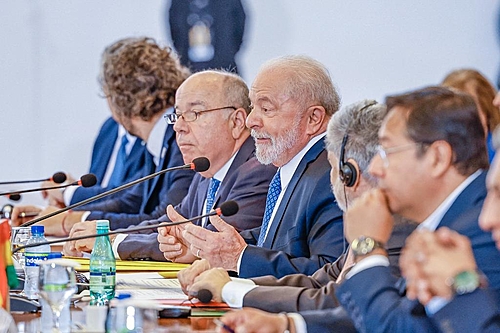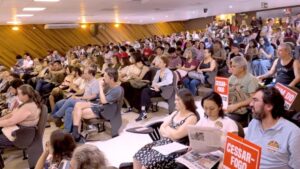
Brazil defends the revitalization of the Union of South American Nations (Unasur) as a way to strengthen regional integration. But it is open to suggestions on the institutional design that might work best to move this process forward, regardless of ideological leanings. This is what President Luiz Inácio Lula da Silva (PT) said on Tuesday (30) at the opening of the summit meeting of South American leaders, in Brasília.
Unasur, according to him, was an effective initiative in the resolution of controversies, in the reduction of deforestation, in the realization of the benefits of citizenship, among other benefits. “We didn’t solve all our problems, but we were willing to face them, instead of ignoring them”, affirmed the petista. “Our South America is no longer just a geographic reference and has become a political reality”.
However, the president knows that there is resistance to Unasur among neighboring countries. According to a report by Folha de S.Paulo, representatives of leaders invited to this meeting stated that they do not agree with an integration based solely on the revitalization of Unasur. They defended that this process be centered on a pragmatic cooperation and that it survives the alternation of power.
Shortly after being elected, at the beginning of last year, the president of Chile, Gabriel Boric, defended regional solutions to the migratory crisis generated by the Venezuelan exodus and also a Latin American economic and environmental agenda independent of the ideological affinities of the leaders at the time.
Created in 2008 by presidents who were exponents of the left, like Lula himself, then in his second term, Unasur stopped working in 2019, when right-wing politicians governed several countries, including Jair Bolsonaro (PL).
“We let ideologies divide us and interrupt the integration effort. We abandoned dialogue channels and cooperation mechanisms and, with that, we all lost”, said the Brazilian president, who also said: “We have no preconceived ideas about the design institutional future that we could adopt. We want to dialogue and know everyone’s opinion”.
Of the 12 South American countries, five (Uruguay, Paraguay, Chile, Colombia and Ecuador) are no longer part of Unasur. Lula recognized that it is necessary to “critically evaluate what did not work and take these lessons into account.”
In addition to the critical review, the president launched some practical suggestions for debate. One of them is to relativize the consensus rule, which “could be restricted to substantive issues, preventing impasses in the administrative spheres from paralyzing our activities”. Recently, at the G7 summit meeting in Japan, Lula also criticized the need for consensus for decision-making in the UN Security Council.
Another suggestion put forward by Lula is the creation of a “High Level Group”, to be made up of personal representatives of each president, to carry on with the work of reflection. This group, according to the Brazilian president, should present a “road map” for the integration of South America in 120 days.
climate and trade
Other prominent topics in the president’s speech were the climate and trade. About the first, he defended that the “lack of collective action affects our ability to contain the increase in global temperature”. With regard to the second, considered by the Brazilian government to be an essential factor in making countries aware of the advantages of integration, Lula suggested some initiatives for his colleagues to consider:
-
putting regional savings at the service of economic and social development, mobilizing development banks such as CAF, Fonplata, Banco do Sul and BNDES;
-
deepen our South American identity also in the monetary area, through more efficient compensation mechanisms and the creation of a common reference unit for trade, reducing dependence on extra-regional currencies;
-
implement regulatory convergence initiatives, facilitating procedures and reducing bureaucracy for exporting and importing goods;
-
expand state-of-the-art cooperation mechanisms, involving services, investments, electronic commerce and competition policy.
Editing: Thales Schmidt
Source: www.brasildefato.com.br

